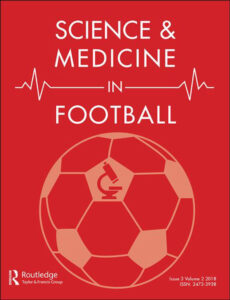Abstract
Purpose: There is growing concern surrounding the harmful effects of soccer heading on cognitive function. The present study aims to examine the immediate effects of heading.
Methods: 30 recreational male soccer players were divided into three groups that undertook 20 consecutive headers with a soft (8.8 psi), hard (16.2 psi), or no (control) ball. A battery of neuropsychological tests was completed before and after heading: King-Devick, trail-making (TM) (A, B), digit span (DS) and spatial span (SS) (forward, backward).
Results: Significant increase in the time (M = 4.44 s) and errors (M = 1.45) for the King-Devick test within the hard and soft groups, although there was no significant difference for TM-A and TM-B. Significant decline for SS forward within the hard and soft groups (M= −16%), although the declines for SS backward (M = −16%), DS forward (M= −23%) and DS backward (M = −25%) were present only for the hard group (ps <.05). Discussion: While outside of regular match-play, this study showed that heading negatively influenced one indicator of a suspected concussion (King-Devick), as well as working memory (DS, SS) that is essential for daily life. These findings contribute to the growing debate surrounding heading safety.

